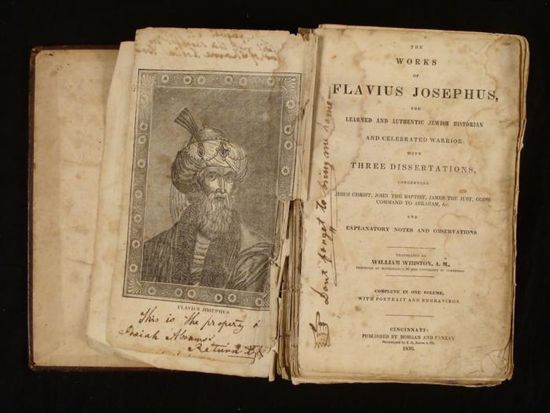Difference between revisions of "Category:Josephus Studies"
| Line 18: | Line 18: | ||
{{WindowMain | {{WindowMain | ||
|title= | |title= Editions of the Works of Josephus | ||
|backgroundLogo= Bluebg_rounded_croped.png | |backgroundLogo= Bluebg_rounded_croped.png | ||
|logo= Logo.png | |logo= Logo.png | ||
|px= 38 | |px= 38 | ||
|content= | |content= | ||
Besides a (lost) first edition of the Jewish War in Aramaic, Josephus composed all his works in Greek. With the exception of the [[Vita]], all works of Josephus were translated into Latin by [[Cassiodurus]]. In the Middle Ages, however, Josephus was known mostly through a Latin paraphrases (named [[Hegesippus]]) and a 10th cent. Hebrew summary (named [[Josippon]]). | |||
''' Editions of the Greek text ''' | |||
The '''editio princeps'' of the Greek text was published in 1544. This text was the basis of the Seneven (1611 & 1634) and Leipzig editions (1691 by Iffig). A more correct text was published by Hudson (Oxford, 1720). The edition by Havercamp (1726) became the ''textus receptus'', followed by Oberthur (1782-85) and Richter (1825-27). An improved edition of the Havercamp text was made by [[Guillaume Dindorf]] (Parsi 1845-47, followed by Bekker (Leipzig 1855-56). Critical edition were completed by Naber (Leipzig 1888-96) and Niese (editio maior, Berlin 1887-95; editio minor, Berlin 1888-96 | |||
'''Editions of the Old Latin text''' | |||
The ''editio princeps'' of the Latin text appeared more than 70 years before the publication of the Greek text, in 1470 in Augsburg by John Schlusser. Editions of the Latin text continued to be published regularly until 1617, then more sporadically. | |||
'''Editions of the Hegesippus''' | |||
The ''editio princeps'' of [[Hegesippus]] appeared in Paris in 1510, and was reprinted in Gallandi's Bibliotheca patrum (tom. vii) and in Migne's Patrologia latina (tom. xv). A critical editition of the text was completed by Weber and Julius Caesar in Marburg in 1864. | |||
'''Editions of [[Josippon]]''' | |||
The best earlier edition is the one published, with a Latin translation, by J.F. Breithhaupt in 1707. | |||
}} | }} | ||
{{WindowMain | |||
|title= Translations of the Works of Josephus | |||
|backgroundLogo= Bluebg_rounded_croped.png | |||
|logo= Logo.png | |||
|px= 38 | |||
|content= | |||
The first printed translations of Josephus (in Italian and German) were based on the Latin text. By the end of the 16th century however the Greek text became the basis of all translations | |||
''' Italian Translations''' | |||
'''German Translations''' | |||
The first German translation also ([[Caspar Hedio]], 1531) was based on the Latin text, but was revised in 1561 based on the Greek text, as all the following translations by [[Ott]] (Zurich 1736); [[Cotta]] (Tubingen 1736) and Demme (7th ed. 1868-69). | |||
'''French translations''' | |||
a French translation was issued by Burgoing in Lyons in 1558. | |||
'''English translations''' | |||
The first English translation ILondon 1683; Cambridge 1693) was made from the French. Whinston (London 1737) became the standard English edition, revised by Shilleto in 1888-89). | |||
'''Other Translations''' | |||
There are translations of Josephus in all major European language. | |||
}} | |||
{{WindowMain | {{WindowMain | ||
Revision as of 11:07, 24 April 2016
|
Josephus Studies (JFS) -- Home Page
Editions of the Works of Josephus Besides a (lost) first edition of the Jewish War in Aramaic, Josephus composed all his works in Greek. With the exception of the Vita, all works of Josephus were translated into Latin by Cassiodurus. In the Middle Ages, however, Josephus was known mostly through a Latin paraphrases (named Hegesippus) and a 10th cent. Hebrew summary (named Josippon). Editions of the Greek text The 'editio princeps of the Greek text was published in 1544. This text was the basis of the Seneven (1611 & 1634) and Leipzig editions (1691 by Iffig). A more correct text was published by Hudson (Oxford, 1720). The edition by Havercamp (1726) became the textus receptus, followed by Oberthur (1782-85) and Richter (1825-27). An improved edition of the Havercamp text was made by Guillaume Dindorf (Parsi 1845-47, followed by Bekker (Leipzig 1855-56). Critical edition were completed by Naber (Leipzig 1888-96) and Niese (editio maior, Berlin 1887-95; editio minor, Berlin 1888-96 Editions of the Old Latin text The editio princeps of the Latin text appeared more than 70 years before the publication of the Greek text, in 1470 in Augsburg by John Schlusser. Editions of the Latin text continued to be published regularly until 1617, then more sporadically. Editions of the Hegesippus The editio princeps of Hegesippus appeared in Paris in 1510, and was reprinted in Gallandi's Bibliotheca patrum (tom. vii) and in Migne's Patrologia latina (tom. xv). A critical editition of the text was completed by Weber and Julius Caesar in Marburg in 1864. Editions of Josippon The best earlier edition is the one published, with a Latin translation, by J.F. Breithhaupt in 1707.
Translations of the Works of Josephus The first printed translations of Josephus (in Italian and German) were based on the Latin text. By the end of the 16th century however the Greek text became the basis of all translations Italian Translations German Translations The first German translation also (Caspar Hedio, 1531) was based on the Latin text, but was revised in 1561 based on the Greek text, as all the following translations by Ott (Zurich 1736); Cotta (Tubingen 1736) and Demme (7th ed. 1868-69). French translations a French translation was issued by Burgoing in Lyons in 1558. English translations The first English translation ILondon 1683; Cambridge 1693) was made from the French. Whinston (London 1737) became the standard English edition, revised by Shilleto in 1888-89). Other Translations There are translations of Josephus in all major European language.
English -- French -- German -- Italian -- Spanish -//- Bulgarian -- Czech -- Danish -- Czech -- Hebrew -- Hungarian -- Japanese -- Korean -- Latin -- Polish -- Portuguese -- Romanian -- Serbian -- Swedish -- Yiddish
|
Categories
Ancient Texts
Cognate Fields
|
Pages in category "Josephus Studies"
The following 98 pages are in this category, out of 98 total.
- Josephus Studies (1450s)
- Josephus Studies (1500s)
- Josephus Studies (1600s)
- Josephus Studies (1700s)
- Josephus Studies (1800s)
- Josephus Studies (1850s)
- Josephus Studies (1900s)
- Josephus Studies (1910s)
- Josephus Studies (1920s)
- Josephus Studies (1930s)
- Josephus Studies (1940s)
- Josephus Studies (1950s)
- Josephus Studies (1960s)
- Josephus Studies (1970s)
- Josephus Studies (1980s)
- Josephus Studies (1990s)
- Josephus Studies (2000s)
- Josephus Studies (2010s)
- Josephus Studies (2020s)
*
~
- Bartolomeo Sacchi (M / Italy, 1421-1481), scholar
- Johannes Schüssler (M / Germany, 15th cent.), printer
- Girolamo Squarciafico (M / Italy, 15th century), scholar
- Lucas Brandis (M / Germany, 15th cent.), printer
- Abraham Conat (M / Italy, 15th cent.), printer
- Robert Goullet (M / France, 1475?-1538), scholar
- Michael Hummelberger (M / Germany, 1487-1527), scholar
- Alfonso de Palencia (M / Spain, 1423-1492), scholar
- Caspar Hedio (M / Germany, 1494-1552), scholar
- Jacob Tam ibn Yahya
- Nicolas de Herberay (M / France, ....-1557), scholar
- Pawel Aquilin Hradecký (M / Czechia, 16th cent.), scholar
- Arnoldus Arlenius (M / Netherlands, 1510-1582), scholar
- Pietro Lauro (M / Italy, 1510c-1568c), scholar
- Jacques Lefèvre d'Étaples (M / France, 1455-1536), scholar
- Juan Martín Cordero (M / Spain, 1520-1584), scholar
- Francesco Baldelli (M / Italy, 16th century), scholar
- Peter Morwen (c1530-c1573), scholar
- Conrad Lautenbach (M / Germany, 1534-1595), scholar
- Sebastian Münster (M / Germany, 1488-1552), scholar
- Thomas Lodge (M / Britain, 1558-1625), scholar
- Abraham ben Samuel Zacuto (M / Spain, Portugal, Tunisia, 1452-1515), scholar
- Robert Arnauld d'Andilly (1589-1674), scholar
- Joseph Semah Arias (M / Spain, 17th century), scholar
- Roger L'Estrange (1616-1704), scholar
- John Hudson (M / Britain, 1662-1719), scholar
- William Whiston (1667-1752), scholar
- Jean Gagnier (1670c-1740), scholar
- Maria Gustava Gyllenstierna (F / Sweden, 1672-1737), scholar, translator
- Anthony Hall (1679-1723), scholar
- Siwart Havercamp (1684-1742), scholar
- Franz Oberthür (1745-1831), scholar
- Francesco Angiolini (M / Italy, 1750-1788), scholar
- Peter Beer (1758-1838), scholar
- Wilhelm Dindorf (1802-1883), German scholar
- Luigi Calori (M / Italy, 1807-1896), scholar
- Gyozo Istóczy (1842-1915), scholar
- Frederick J. Foakes-Jackson (1855-1941), scholar
- Heinrich Clementz (1859-1946), scholar
- Andrzej Niemojewski (1864-1921), scholar
- Vincenzo Ussani (1870-1952), scholar
- Meir Balaban (1874-1942), scholar
- Paul Krüger (b.1880), scholar
- József Révay (1881-1970), scholar
- Norman Bentwich (1883-1971), scholar
- Lion Feuchtwanger (M / Germany, 1884-1958), novelist
- Yehiel Yeshaia Trunk (1887-1961), novelist
- Giuseppe Ricciotti (M / Italy, 1890-1964), scholar
- Geoffrey Arthur Williamson (1895-1982), scholar
- Dušan Glumac (M / Serbia, 1899-1980), scholar
- Luis Farré (M / Argentina, 1902-1997), scholar
- André Pelletier (1902-1985), French scholar
- Nahum N. Glatzer (1903-1990), scholar
- István Hahn (1913-1984), scholar
- Luigi Moraldi (M / Italy, 1915-2001), scholar
- Hiroshi Shinmi (M / Japan, 1923-1979), scholar
- Louis H. Feldman (1926-2017), Jewish American scholar
- Paul L. Maier (b.1930), scholar and novelist
- Giorgio Jossa (1938-), scholar
- Per Bilde, scholar
- Gōhei Hata (M / Japan, 1942), scholar
- Karol Sidon (M / Czechia, 1942), novelist
- William R.G. Loader (b.1944), scholar
- Etienne Nodet (1944-), scholar
- Tessa Rajak (1946-), scholar
- Lucio Troiani (M / Italy, 1947), scholar
- Francesca Calabi (F / Italy, 1948), scholar
- Shaye J.D. Cohen (M / United States, 1948), scholar
- Martin Goodman (1953-), scholar
- Tibor Grüll (b.1964), scholar
- Nuno Simões Rodrigues (b.1968), scholar
- Margarita Rodríguez de Sepúlveda, scholar
- Bojan Piperov (20th cent.), scholar
Media in category "Josephus Studies"
This category contains only the following file.
- 1984-E * Stone.jpg 333 × 499; 21 KB






